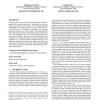Free Online Productivity Tools
i2Speak
i2Symbol
i2OCR
iTex2Img
iWeb2Print
iWeb2Shot
i2Type
iPdf2Split
iPdf2Merge
i2Bopomofo
i2Arabic
i2Style
i2Image
i2PDF
iLatex2Rtf
Sci2ools
106
Voted
ATAL
2005
Springer
2005
Springer
Predicting agent strategy mix of evolving populations
We study agent societies where self-interested agents interact repeatedly over extended time periods. In particular, we are interested in environments where agents can form mutually beneficial relationships by exchanging help but an agent would rather receive help than give it. Evolutionary tournaments with competing help-giving strategies can model scenarios where agents periodically adopt strategies that are outperforming others in the population. Such experiments, however, can be computationally costly and hence it is difficult to prescribe a rational strategy choice given environmental conditions like task mix, strategy distribution in the population, etc. A preferred approach, pursued in this paper, is to analytically capture the dynamics of the strategy mix in the population under an evolutionary tournament. Such an analytical model can be used to predict the evolutionarily dominant strategy, the rational strategy choice. Categories and Subject Descriptors I.2.11 [Artificial ...
Related Content
| Added | 26 Jun 2010 |
| Updated | 26 Jun 2010 |
| Type | Conference |
| Year | 2005 |
| Where | ATAL |
| Authors | Sabyasachi Saha, Sandip Sen |
Comments (0)

